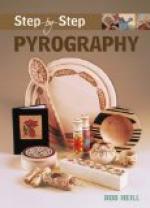They found Brother John by his bee-skeps brown
Watching his bees in their elfin town.
“Little folk, little folk all a-wing,
More honey is yours when ye do not sting,
And that is a very sensible thing,”
Said
Brother John to the bees.
They found Brother Gildas a-fishing for trout,
Oblivious that any one was about.
“Finny folk, finny folk, deep in the fen,
There’s a bait for each fish if we only
know when,—
And that is the way to fish for men,”
Said
Brother Gildas to the fishes.
They found on the moorland bleak and cold
Brother Sebastian, far from the fold.
“Sheep of my sheepfold, by night and by
day
I seek ye untiring wherever ye stray,—
For thus ye have taught me the Master’s
own way,”
Said
Brother Sebastian the shepherd.
And the brethren were silent. Each prayed
in his heart
That in all of his doings in craft or in art
He might give God the glory. Since Adam’s
fall
The workman is nothing, the work is all.
There was peace in the cloisters. The Abbot
that night
Gave thanks that his children had found the
light.
IV
PADRAIG OF THE SCRIPTORIUM
Padraig sat on the side of the hill where the Good People were said to dance rings in the turf, his chin on his folded arms, his, arms resting on his drawnup knees—thinking. He might have been taken for a sheogue himself had any one been there to see. His hair was like a red flame, and his eyes were blue as the sky; his arms and legs were as brown as his young, sharp face, and he wore but one garment, a goatskin tunic. He could run like a hare and climb like a squirrel and swim like a salmon, for he had lived like a savage all his life, among the Irish hills.
Before he could remember, he had lost his father, a clever tinker who could make silver brooches and mend brass kettles and had married an Irish colleen in a seashore village. Then pirates raided the coast, and the Irish girl with her baby escaped only by hiding in a cellar under a ruined house. When the boy was seven years old his mother died, and since then he had gone from one village to another as the fancy took him. For a week or more he might be herding goats or sheep, fishing, or cutting peat for fires; he stayed nowhere longer than he chose and owned nothing in the world except what he wore. Under the tunic there hung a small leather bag with the few relics his mother had left him. He could make a fish-hook of a bit of bone, a boat of reeds, or a snare of almost any material he could find where he happened to be.
From this place where he sat he could see a valley of wet meadow-land, in the midst of which gray stone buildings were massed inside a wall which enclosed also the garden and the cloisters. He knew that this was an abbey.




